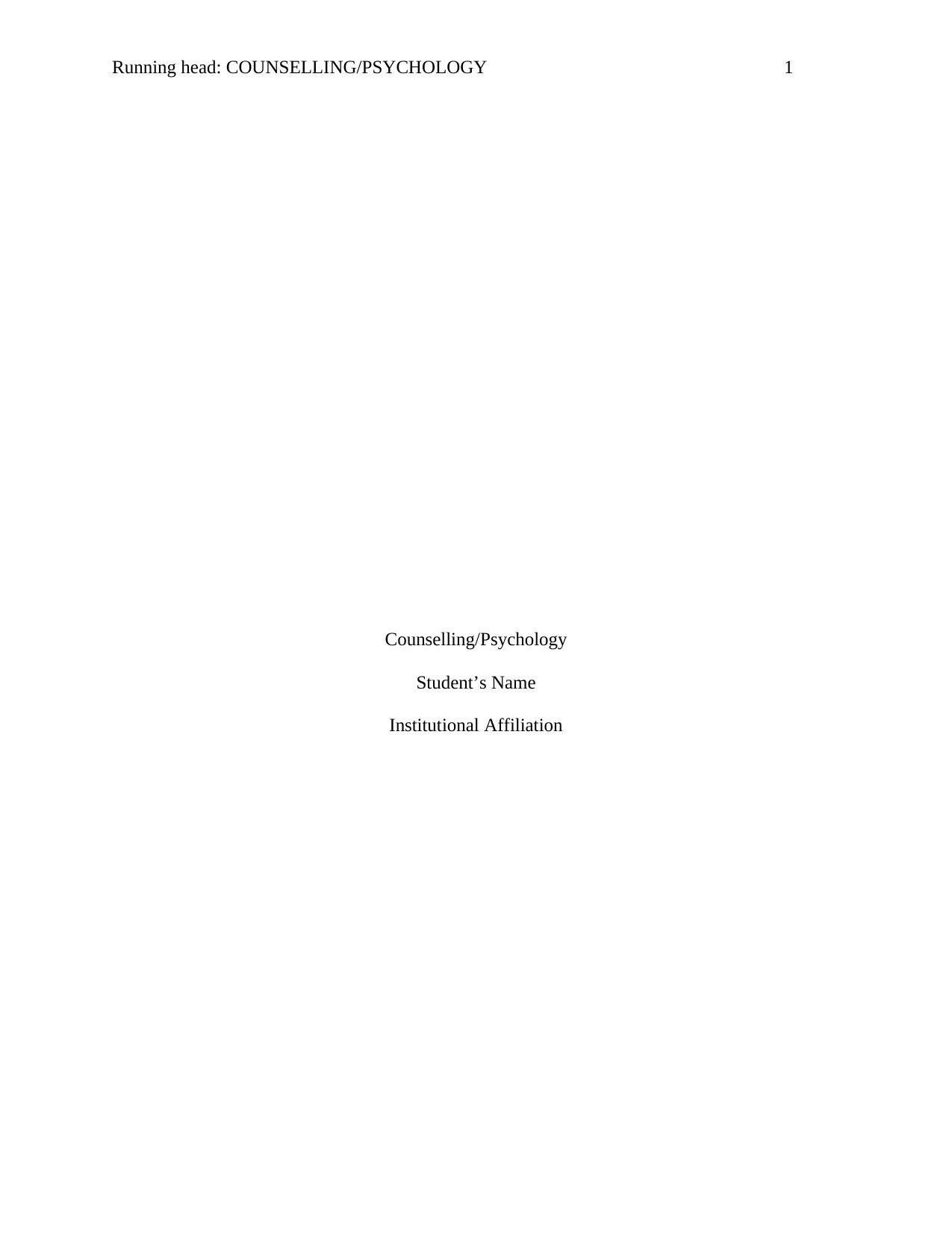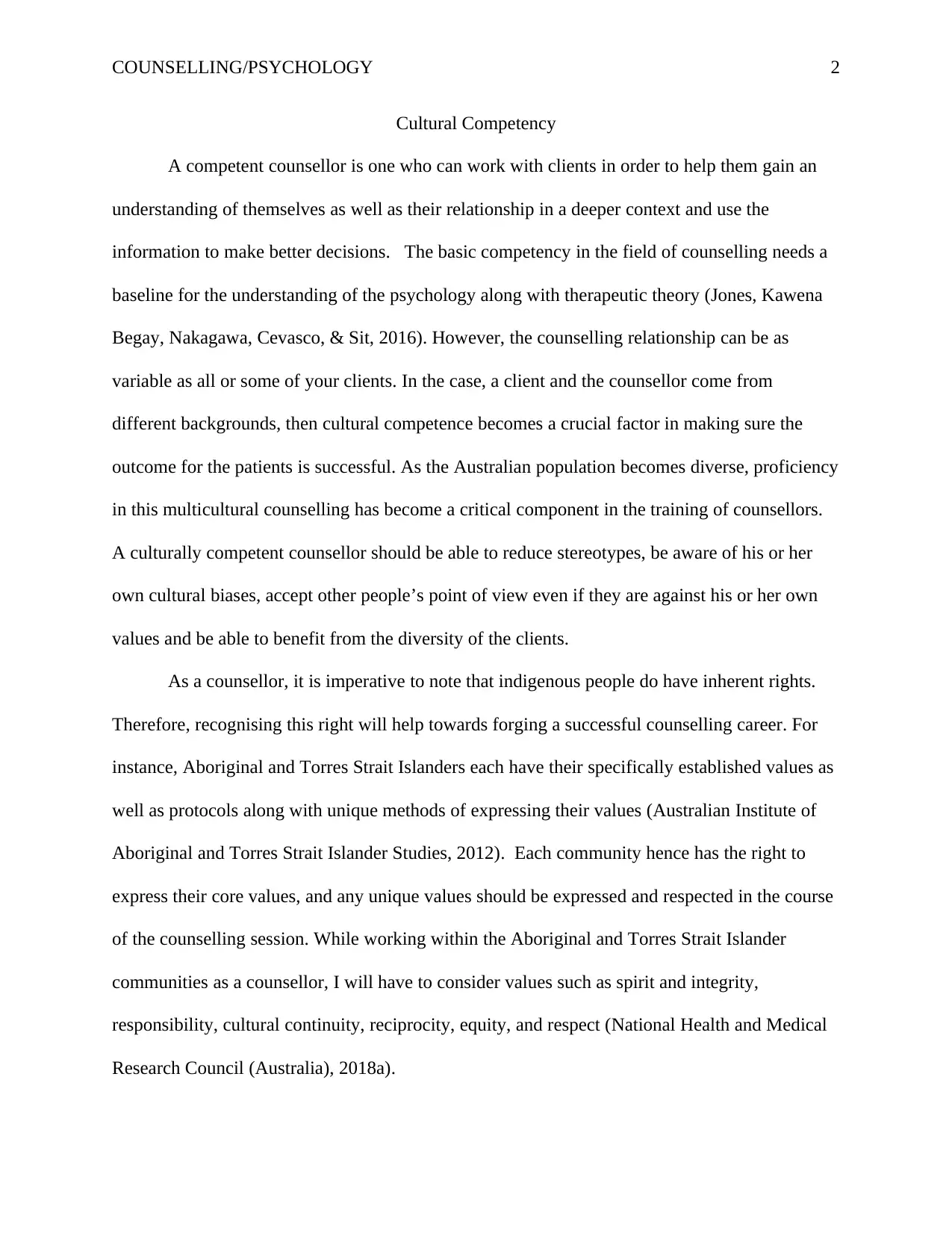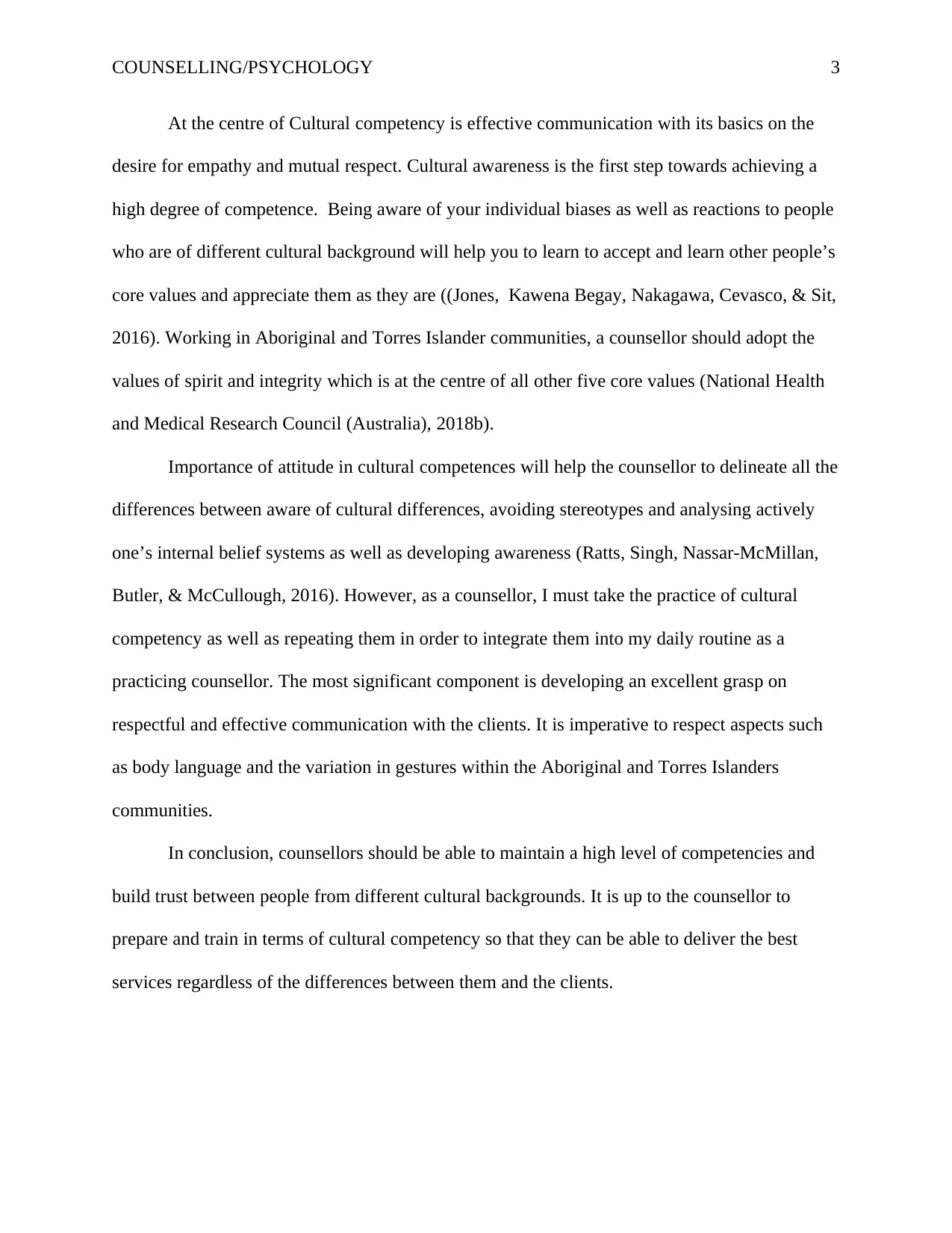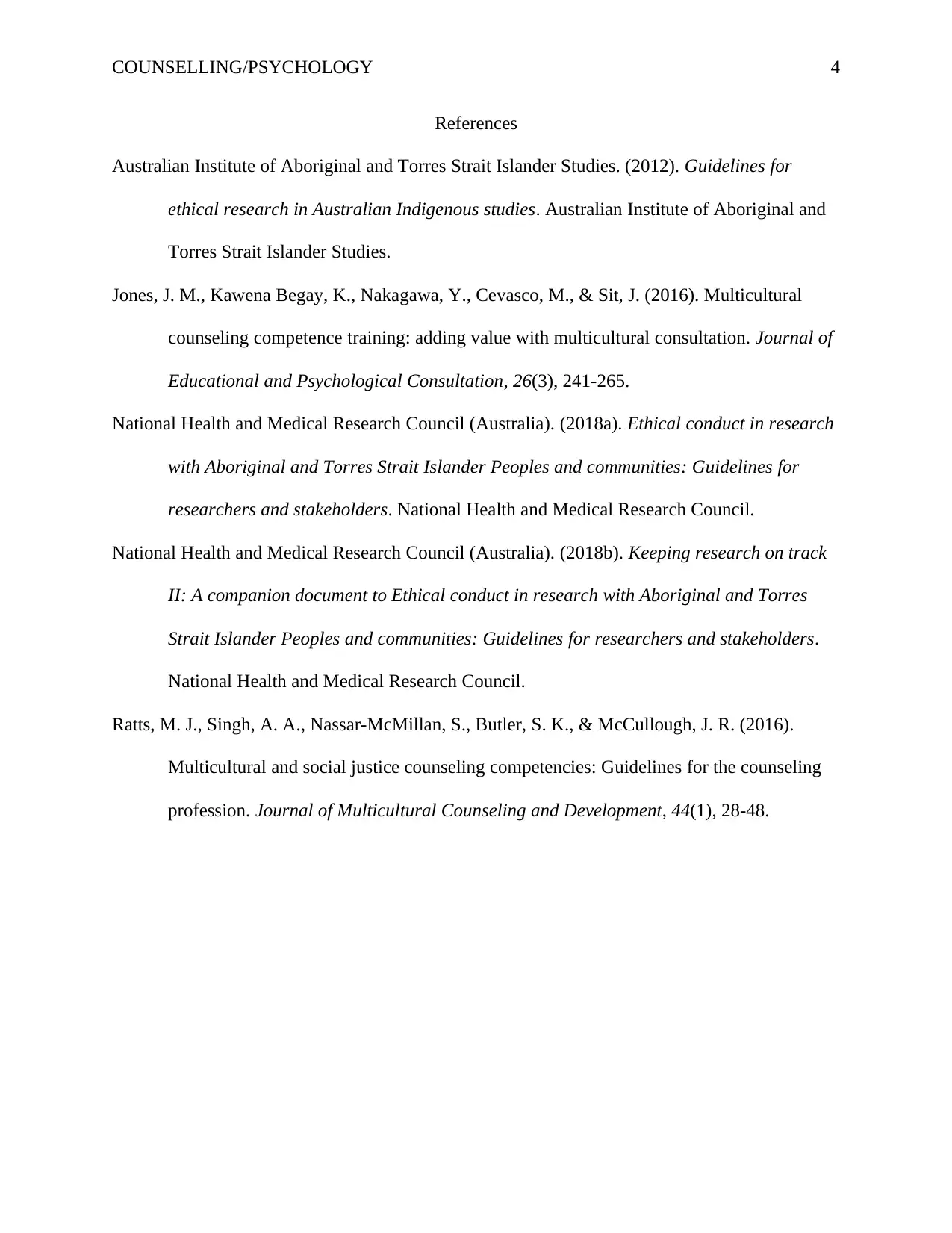Counselling and Psychology: Cultural Competency in Practice
VerifiedAdded on 2022/10/04
|4
|919
|41
Essay
AI Summary
This essay delves into the crucial role of cultural competency in counselling, emphasizing the need for counsellors to understand and respect diverse backgrounds, particularly within the context of Aboriginal and Torres Strait Islander communities in Australia. The essay highlights the importance of recognizing inherent rights, values, and protocols specific to these communities. It underscores the significance of effective communication, empathy, and mutual respect as foundational elements of culturally competent practice. The author emphasizes the need for counsellors to be aware of their own biases, embrace cultural sensitivity, and adopt values such as spirit, integrity, responsibility, cultural continuity, reciprocity, equity, and respect. The essay concludes by advocating for ongoing training and practice in cultural competency to ensure the delivery of optimal counselling services to all clients, regardless of their cultural backgrounds.

Running head: COUNSELLING/PSYCHOLOGY 1
Counselling/Psychology
Student’s Name
Institutional Affiliation
Counselling/Psychology
Student’s Name
Institutional Affiliation
Paraphrase This Document
Need a fresh take? Get an instant paraphrase of this document with our AI Paraphraser

COUNSELLING/PSYCHOLOGY 2
Cultural Competency
A competent counsellor is one who can work with clients in order to help them gain an
understanding of themselves as well as their relationship in a deeper context and use the
information to make better decisions. The basic competency in the field of counselling needs a
baseline for the understanding of the psychology along with therapeutic theory (Jones, Kawena
Begay, Nakagawa, Cevasco, & Sit, 2016). However, the counselling relationship can be as
variable as all or some of your clients. In the case, a client and the counsellor come from
different backgrounds, then cultural competence becomes a crucial factor in making sure the
outcome for the patients is successful. As the Australian population becomes diverse, proficiency
in this multicultural counselling has become a critical component in the training of counsellors.
A culturally competent counsellor should be able to reduce stereotypes, be aware of his or her
own cultural biases, accept other people’s point of view even if they are against his or her own
values and be able to benefit from the diversity of the clients.
As a counsellor, it is imperative to note that indigenous people do have inherent rights.
Therefore, recognising this right will help towards forging a successful counselling career. For
instance, Aboriginal and Torres Strait Islanders each have their specifically established values as
well as protocols along with unique methods of expressing their values (Australian Institute of
Aboriginal and Torres Strait Islander Studies, 2012). Each community hence has the right to
express their core values, and any unique values should be expressed and respected in the course
of the counselling session. While working within the Aboriginal and Torres Strait Islander
communities as a counsellor, I will have to consider values such as spirit and integrity,
responsibility, cultural continuity, reciprocity, equity, and respect (National Health and Medical
Research Council (Australia), 2018a).
Cultural Competency
A competent counsellor is one who can work with clients in order to help them gain an
understanding of themselves as well as their relationship in a deeper context and use the
information to make better decisions. The basic competency in the field of counselling needs a
baseline for the understanding of the psychology along with therapeutic theory (Jones, Kawena
Begay, Nakagawa, Cevasco, & Sit, 2016). However, the counselling relationship can be as
variable as all or some of your clients. In the case, a client and the counsellor come from
different backgrounds, then cultural competence becomes a crucial factor in making sure the
outcome for the patients is successful. As the Australian population becomes diverse, proficiency
in this multicultural counselling has become a critical component in the training of counsellors.
A culturally competent counsellor should be able to reduce stereotypes, be aware of his or her
own cultural biases, accept other people’s point of view even if they are against his or her own
values and be able to benefit from the diversity of the clients.
As a counsellor, it is imperative to note that indigenous people do have inherent rights.
Therefore, recognising this right will help towards forging a successful counselling career. For
instance, Aboriginal and Torres Strait Islanders each have their specifically established values as
well as protocols along with unique methods of expressing their values (Australian Institute of
Aboriginal and Torres Strait Islander Studies, 2012). Each community hence has the right to
express their core values, and any unique values should be expressed and respected in the course
of the counselling session. While working within the Aboriginal and Torres Strait Islander
communities as a counsellor, I will have to consider values such as spirit and integrity,
responsibility, cultural continuity, reciprocity, equity, and respect (National Health and Medical
Research Council (Australia), 2018a).

COUNSELLING/PSYCHOLOGY 3
At the centre of Cultural competency is effective communication with its basics on the
desire for empathy and mutual respect. Cultural awareness is the first step towards achieving a
high degree of competence. Being aware of your individual biases as well as reactions to people
who are of different cultural background will help you to learn to accept and learn other people’s
core values and appreciate them as they are ((Jones, Kawena Begay, Nakagawa, Cevasco, & Sit,
2016). Working in Aboriginal and Torres Islander communities, a counsellor should adopt the
values of spirit and integrity which is at the centre of all other five core values (National Health
and Medical Research Council (Australia), 2018b).
Importance of attitude in cultural competences will help the counsellor to delineate all the
differences between aware of cultural differences, avoiding stereotypes and analysing actively
one’s internal belief systems as well as developing awareness (Ratts, Singh, Nassar‐McMillan,
Butler, & McCullough, 2016). However, as a counsellor, I must take the practice of cultural
competency as well as repeating them in order to integrate them into my daily routine as a
practicing counsellor. The most significant component is developing an excellent grasp on
respectful and effective communication with the clients. It is imperative to respect aspects such
as body language and the variation in gestures within the Aboriginal and Torres Islanders
communities.
In conclusion, counsellors should be able to maintain a high level of competencies and
build trust between people from different cultural backgrounds. It is up to the counsellor to
prepare and train in terms of cultural competency so that they can be able to deliver the best
services regardless of the differences between them and the clients.
At the centre of Cultural competency is effective communication with its basics on the
desire for empathy and mutual respect. Cultural awareness is the first step towards achieving a
high degree of competence. Being aware of your individual biases as well as reactions to people
who are of different cultural background will help you to learn to accept and learn other people’s
core values and appreciate them as they are ((Jones, Kawena Begay, Nakagawa, Cevasco, & Sit,
2016). Working in Aboriginal and Torres Islander communities, a counsellor should adopt the
values of spirit and integrity which is at the centre of all other five core values (National Health
and Medical Research Council (Australia), 2018b).
Importance of attitude in cultural competences will help the counsellor to delineate all the
differences between aware of cultural differences, avoiding stereotypes and analysing actively
one’s internal belief systems as well as developing awareness (Ratts, Singh, Nassar‐McMillan,
Butler, & McCullough, 2016). However, as a counsellor, I must take the practice of cultural
competency as well as repeating them in order to integrate them into my daily routine as a
practicing counsellor. The most significant component is developing an excellent grasp on
respectful and effective communication with the clients. It is imperative to respect aspects such
as body language and the variation in gestures within the Aboriginal and Torres Islanders
communities.
In conclusion, counsellors should be able to maintain a high level of competencies and
build trust between people from different cultural backgrounds. It is up to the counsellor to
prepare and train in terms of cultural competency so that they can be able to deliver the best
services regardless of the differences between them and the clients.
⊘ This is a preview!⊘
Do you want full access?
Subscribe today to unlock all pages.

Trusted by 1+ million students worldwide

COUNSELLING/PSYCHOLOGY 4
References
Australian Institute of Aboriginal and Torres Strait Islander Studies. (2012). Guidelines for
ethical research in Australian Indigenous studies. Australian Institute of Aboriginal and
Torres Strait Islander Studies.
Jones, J. M., Kawena Begay, K., Nakagawa, Y., Cevasco, M., & Sit, J. (2016). Multicultural
counseling competence training: adding value with multicultural consultation. Journal of
Educational and Psychological Consultation, 26(3), 241-265.
National Health and Medical Research Council (Australia). (2018a). Ethical conduct in research
with Aboriginal and Torres Strait Islander Peoples and communities: Guidelines for
researchers and stakeholders. National Health and Medical Research Council.
National Health and Medical Research Council (Australia). (2018b). Keeping research on track
II: A companion document to Ethical conduct in research with Aboriginal and Torres
Strait Islander Peoples and communities: Guidelines for researchers and stakeholders.
National Health and Medical Research Council.
Ratts, M. J., Singh, A. A., Nassar‐McMillan, S., Butler, S. K., & McCullough, J. R. (2016).
Multicultural and social justice counseling competencies: Guidelines for the counseling
profession. Journal of Multicultural Counseling and Development, 44(1), 28-48.
References
Australian Institute of Aboriginal and Torres Strait Islander Studies. (2012). Guidelines for
ethical research in Australian Indigenous studies. Australian Institute of Aboriginal and
Torres Strait Islander Studies.
Jones, J. M., Kawena Begay, K., Nakagawa, Y., Cevasco, M., & Sit, J. (2016). Multicultural
counseling competence training: adding value with multicultural consultation. Journal of
Educational and Psychological Consultation, 26(3), 241-265.
National Health and Medical Research Council (Australia). (2018a). Ethical conduct in research
with Aboriginal and Torres Strait Islander Peoples and communities: Guidelines for
researchers and stakeholders. National Health and Medical Research Council.
National Health and Medical Research Council (Australia). (2018b). Keeping research on track
II: A companion document to Ethical conduct in research with Aboriginal and Torres
Strait Islander Peoples and communities: Guidelines for researchers and stakeholders.
National Health and Medical Research Council.
Ratts, M. J., Singh, A. A., Nassar‐McMillan, S., Butler, S. K., & McCullough, J. R. (2016).
Multicultural and social justice counseling competencies: Guidelines for the counseling
profession. Journal of Multicultural Counseling and Development, 44(1), 28-48.
1 out of 4
Related Documents
Your All-in-One AI-Powered Toolkit for Academic Success.
+13062052269
info@desklib.com
Available 24*7 on WhatsApp / Email
![[object Object]](/_next/static/media/star-bottom.7253800d.svg)
Unlock your academic potential
Copyright © 2020–2026 A2Z Services. All Rights Reserved. Developed and managed by ZUCOL.




